Between BOHEMIA and MALLORCA with Tomeu Coll
- Zuzana Malina Cernohousova

- Jan 6, 2023
- 23 min read
Updated: Jan 10, 2023
" Badlands is about my love and hate for this island."
Dear Tomeu, to create some background for our exchange of thoughts and words, to get known various connections between our places and circumstances, I would like to talk a bit about your life in general.

When have you been born and where did you spent the first years of your childhood?
I was born in Palma (July,14 1981), in Mallorca, and until my 20’s I had been living in the same town, located a few kilometers from Palma, in a village called Sant Jordi, just next to the airport.
Do you have some archive pictures from this time?
Yes, will look for them later.
Tell me a bit about your parents.
They were both very dedicated and caring parents. My mother worked at home, taking care of my brother, my sisters and me, while my father was working at the airport as a sort of engineer.

That’s very similar to my family. I had three younger brothers, my mum was at home and my father was kind of technician / driver / engineer. Because he was against the communist regime, he couldn’t study and go further in his skills.
Where have your grandparents lived? Have you been visiting them regularly? Or just occasionally during holidays?
They both were from Mallorca too, from my mother side they were from Sant Jordi, and from my father side from Pòrtol, both villages are close to each other, few kilometres east and southeast of Palma. Both families were family of peasants, so my relation with the land is deep enough to understand that without soil we can’t make a living. And I do visit them regularly, twice a week or even more. That’s something about to live in a small island. There is more possibility to me to learn what is important to learn. Because I always took seriously to learn from our grandparents.
Again some match, well …. We had our grandparents from both sides very close too – living at the same village. Actually one grandmother lived in our house and the other grandparents at the other end of the village. We were seeing them very often.
Who did you have or still have most special relationship with? Most close and inspirational? Was it common in Majorcan society to keep close inner and physical contact with others?
Mmm… well, I felt very close with all my family, hard to choose one person. Inspiration always jumps over a generation probably, so my grandmothers were very special to me, as they were more communicative than men in those times, at least for me as a kid. Don’t know what to say about the contact, we were close and we hugged each other, not as a very common thing, because we saw each other all the time, so the way of caring became something more about connections with the stories we told each other rather than the body contact, but still we got close, yes.
What are your first memories related to the island, its environment and society?
There are many memories, but most of them are related to the countryside, to animals like goats, sheep, dogs, ducks… all kind of them, because of my relation with my grandparents, whom I helped to.
Can you tell me more about your growing up in the island, about your relationship to the sea?
I barely have any relation to the sea. Nor my parents do. Of course we used to go a couple of times each summer, but was not the main activity, in compare with what it means today. None of my grandparents have ever put a feet into the sea, maybe only to collect some algae to feed the soil of their farms, or to clean the horses. In those times wasn’t very common to spend time in the beach. At the end of the 50’s everything has changed, but still, as my grandparents were not “the sea people”, my parents were neither.

I understand. This is actually another similarity. My grandparents were surrounded by forest, same as yours by the sea. But one of my grandmothers told me she went there just a few times during her youth, to receive a secret kiss from some boy. And the other grandmother used to go just a couple of times to pick up mushrooms and blueberries always in the summer and autumn. You mentioned algae, which is very actual topic nowadays, its meaning, benefit and importance of its protection. Was it common to collect algae to feed the soil?
Yes, the society at those times was mainly agricultural.
And to bath horses in the sea?
Yes, not only the horses, also cows, goats, maybe sheep…
I think I saw a painting of such image in Mallorca, from the Spanish impressionistic painter Joaquín Sorolla. The one, who was also a teacher of Majorcan painter Pilar Montaner de Sureda. Sorolla did spend some time in Mallorca and horses bathing in the sea was one of his motives.

Why everything has changed in 50’s? What happened then?
Tourism industry and touristic society have changed everything here. No more local independent fishermen. No more fishermen villages, for instance. Tourism, as a coal mine in the mountains of Peru, have changed everything. I mean, of course, not all inhabitants of the island are indigenous, but somehow everybody comes from the day and place we were born, so tourism, as mass movement of people in a sort of undetermination, just moving from point A to point B for the sake of entertainment, distraction, spectacle, it has become the absurdity of the changes. I do not know if I’m explaining it right, but you know, moving within the world should be more collective and interesting will, not only for absorbing the resources in the “name of the consumism”.
Did you think of travelling or even living in different country in early youth yourself? Like most of us post-communist young Czechs did? Or did you feel rather content with all what’s in the island?
I’m always ready to move anywhere if I need to, but since the Covid-19 appeared, the world looks different to me, and I am not very clear where to move if I needed to. Also I must say that to travel or even just move around nowadays carries a mountain of questions about if it’s ethical, of course always thinking of not contributing to all this massive tourism wave which is invading all cultures globally. I think it’s a shame how people move from one country to another without even having real interest in local life at these places. Whether it’s Mallorca or Prague, the same shops everywhere, the same selfies, the same lack of interest in others.
This is very strong thing to say – „tourism invading our culture“ … can you tell me more of what you mean by that? People moving around do not invade culture by just coming and going, consuming in between some offered staff, do they?
Yes, I do think tourism, understanding this as people moving within the world only for fun, entertainment, spectacle, around resorts, etc… is killing the culture of the places, especially the small ones. Islands are suffering from this, becoming a kind of attraction park for people with high income, who travel by cruiseships, or around the world doing what is from this sort of people just expected. For instance, if you travel to Machu Picchu, what people use to do wastaking ayahuasca with a shaman. Nowadays, most of the shamans do their rituals for tourists that arrive there. You can say… “but it’s a new experience for the “tourists” blah blah blah, but before this, those shaman probably did the rituals for people of their village/tribe/community, and now it changed and they do it just for tourists, for money, loosing, of course, the soul of the thing, because what tourists do, (when we talk about mass tourism, and almost everything is mass tourism), is just do things because everybody else do them. Well, we can talk more extensively about this. I’m still going through the idea of it, but I’m in the right direction, that’s what I feel.
Tourists invading our cultures sounds still a bit sci-fi to me, but also actual yes, and to think about for sure. I have quite opposite point of view and experience and I would like to share it and think it over with you. Later. To what you said now, reminds me of one sci-fi author called Robert Silverberg. His prose could be described as science fiction of the age of tourism / at the age of “colonialist tourism” if you wish - his heroes visit exotic places not for new knowledge, but for fun. The people of the future in one of his short story reconstruct the most famous cities of the past and then visit them to look for superficial impressions. This is really strong topic and we will get back to it for sure, both elaborating that thoughts.
I don’t mean we can’t travel, we can and we should, but we have to do it in a different way, without invading, being more close to the place, territory, people, more curious, trying to acknowledge and transmit cultures, traditions and understanding, and not trying to change the life of people that have lived in these places forever, unless they are living in the most extreme poverty. I mean, the other day I was told that a new neighbor in a small village, a foreigner who bought a house there, was complaining about some donkey making noise, he even called the police. That donkey was there for about fifteen years and nobody never complained about to hear him, but that new neigbor did and the police finally told the owner of the donkey that he can’t have it there anymore because it’s an urban area. Of course all the other neighbors were in rage, because everybody loved the donkey. But you know, the law is the law, specially when it comes to new people who are not tolerant to original characteristic of the location they choose to live, because they can afford it, having it as second or third property in other countries. So, well, this is the worldwide islands problem. Colonialism, tourist colonialism. In Jamaica locals can’t go to the coast, all is private.
I understand your point and have to agree with that point. But, on the other side, what i have been through in Mallorca, was that even that i keep coming since almost six years, regularly, often out of season, also during covid times, for a few weeks in a row always, staying local, in cold houses J, taking the public transport and working hard on local topics or my projects connected to it, with an aim to be useful to the island and its people, not just consume it’s beauty (which is actually the statement of my project within PHOTOILLUSTRATA), still, most locals see me (nota all, but most) only as a source of money, they are dissapointed and not very open, if they see im not rich J. So I am wondering, who causes tourism. Which side is more guilty? Or is it again some fenomena based on cause and effect, heading to some balance in time, as all fenomena in the world tend too?
Now to photography ….
When did the interest for photography appeared in your life?
I could not figure out an answer for this question. But I always remember the old camera my father had at home, Zenit, which I still have somewhere in my studio.
Did you study it or started to explore this media by yourself?
Both, first I studied, but then continued by myself, because in that Center I was studying, the course was very slow, so I decided to continue by myself, because my curiosity was so big, that I couldn’t stand to have to be waiting for my colleagues to finish using the enlarger to be able to use it by myself. I have been always very restless, meant doing things in my own rhythm.
Can you specify the Center? Where actually in Majorca you can study photography? Or is it more usual to go to the land? Like to Barcelona?
I studied photography with some independent teachers. I can’t remember their names. Then in Palma there is a School of Visual Arts, called L'Escola d'Art i Superior de Disseny de les Illes Balears, where they have a specialization in Art Photography. I had stayed only for six months there, then I went to Barcelona, to the Universitat Autònoma de Barcelona, to assist to the Master Degree program in Photojournalism.
What was your first influences? Visual inspirations? Or inner inspirations?
Can’t remember exactly, but probably some French photographer, like Cartier Bresson or Willy Ronis, then I jump into Magnum and discovered many others. After I discovered Diane Arbus and Garry Winogrand, and it all made sense.
So we could say humanistic and journalistic photography is what attracted you and forms how you work, right?
Yes! We can say something like this, but also the big masters helped me, even the Czech ones like Jan Sudek, than Niepce, Stieglitz, Margarett Bourke-White, Imogen Cunningham, etc… Miroslav Tychy, this one is not really an old master, but he was a sort of inspiration.
You are naming some photographers, which are inspirations to you. My question aimed actually more for some thoughts / feelings / perceptions / motivations which directed you to start to photograph. Did you came to it because you just liked the activity itself? Or did you wish to document things? For yourself? Or more to communicate it to others?
I started mostly to photograph things all around, that maked me feel like I want to keep that memory. I didn’t know why, but it was some feeling like that. Then it became more complicated. I was approaching fear or reality, which was not mine. It motivated me to be curious and try to understand as many people as I can, just to have an idea of how big and complicated, or not, the world and society we live in. So, maybe it was my fear of loosing things, or only my curiosity, or the will to understand one of our senses, the sight, who knows… I can’t say only one thing, there was many impulses, and still are. I somehow still dont’t know exactly what or why I am photographing. I like to mention what Garry Winogrand said about it: “I photograph to see how are things after being photographed”. And it makes sense sometimes. Then I always felt very lucky to have met Donna Ferrato and had been working with her in New York back in 2006. Since that year she has become my great inspiration, not only in photography, but in life itself.
Can you tell me more about her? Her as a person and as a photographer? Which of her qualities inspire you?
Donna is probably the best photographer I ever met and I can feel that she is even my best friend. Not even the distance can separate our talks, our presence through the space. She is very close and transparent with people, that’s what makes her a very good photographer and a person. Both atributes can’t be separate when we talk about Donna. Every single thing of her personality inspires me. Her past, her way of seeing the world, her persistence, strength and also her weaknesses, although she is not weak at all, because she is always ready to kick out the jams.
You have mentioned an exhibition of her work you are planning to build up in Palma. When and what concept it’s going to have – which part of her work? If it’s known already.
I can not talk about the exhibition yet. As soon as everything will be signed, will tell you more about it. But it’s about her new book, that’s what I can say for now .. well, write. haha
Ok. So, did you start working with black and white? Analog? How do you work now?
Yes, I did started with black and white, and the analog camera, but also in color. I’m very loyal to my Leica M6, and have no other 35mm camera than that. Now I also have a Linhof 4x5, and it’s a new world for me to explore everything again.
Who are your most favorite photographers nowadays? You mentioned, when we met in Arles, there Klavdij Sluban was top for you … any others and why? Visually? Or as personalities? Way of life, way of creating?
Garry Winogrand, Diane Arbus, Donna Ferrato, Lee Friedlander, Robert Frank, Mary Ellen Mark, and many more, but these are a real inspiration to keep going.
Who are your photography heroes from the history? I mean from really the old times. In Czechia we turn a lot to František Drtikol, Josef Sudek, Jaromír Funke, Evžen Wiškowský, Jaroslav Rossler, Alexander Hackenschmied, to the surrealists Jindřich Štýrský, Toyen, and many others…. these are some of the famous Czech names and for us kind of roots of Czech photography – from pictorialism via surrealism and avantgard to modernism … So I was wondering, if from the begging of 20th century there are some favorite ones for you.
Jan Sudek , Miroslav Tychy, Brassaï and some other portraitists, but I was never a big big fan
of the first wave.
And which Majorcan photographers – from history and from nowadays you know, whose work is somehow memorable for you? Even if it’s not exactly your cup of tea maybe? And also this next question is connected to it … would it be able to get some Majorcan names? Concerning me I was able to catch these names, for example Guillem Bestard, Tony Catany, Miquel Salom. You?
I have no idea now, I know I have some, but I was never seduced by them. Although this week I discovered two Menorca’s photographers of the early 50’s-to 80’s, that are really good ones. Lluis Real and Toni Vidal.
Photographers from early ages of its existence living and creating in Majorca? Did it exist or was it very rare in the island in 20’s 30’s ? Or let’s say in Catalunya, if that’s better?
Will look for them. In Catalonia there was Joan Colom, who was a very good one. Tony Catany is nice, not my cup of tea, but I respect his work, especially for how he found his subjects in the island that were losing theirs soul.
Can you name some of the body of work of Tony Catany, which you have on your mind?
Have no one in my mind to be honest. I was never a big follower of his work, but the few things I know are very accurate and special, but in those times, when I started with photography, it didn’t catch my attention. I should study his work a little bit more to be able to give a real opinion.
Actualy, I’m just thinking, there must be some publicly known local names - photographers, just all those evidences of the painters working around the island. All those archive pictures. Who made them? Maybe even Jean Painlevé was in the island … I wonder … Would be useful also to work with the past showing it public and help to preserve what’s covered by the mass tourism, as you say. I can through on board Miquel Salom, for example, because he was the first photographer and my closer personal contact in Mallorca, when I came there for the first time in 2017. He made good living as commercial photographer, but than devoted to the classical old methods. He decided to use this “authentic process from the genesis of photography” after being inspired by the work of 19th-century photographer Carleton Watkins, whose images of Yosemite he had seen during a visit to Stanford University, California.
Let’s get back to you, do you prefer to present your work in a form of exhibition or rather photobook? Or do you think it always should go together?
It doesn’t need to go together always, I have works that I only present in exhibitions, and other I only published in a limited photobooks or in magazines. Each work breathes by itself.
On you website you also present a few short films. Except it introduces the exhibitions, are you ambitious with filmmaking any further?
I started with filmmaking before photography, so there is something in telling stories with a film camera that still catches me. But by now I’m not thinking about it. Will do it soon, I’m sure I will be back to cinema some day. I madetwo shortfilms in the Academy, where I studied filmmaking, in Mallorca. But the school had to close just when I finished, it was in 2004 I guess. I was the only one that could shoot a shortfilm with 35mm. It was beautiful to be able to use one of those beauties. The story was about a Bar in a village where the stuffed mutant animals were. It doesn’t exist anymore, that’s why I’m happy to have that shortfilm. Someday I should digitalize it …can you believe I still didn’t…haha
The body of work from Russia, by the way, is originally in color, but you show it black and white on your website. Does it have any particular purpose?
No, basically I had both rolls in my bag, and sometimes I was using color and other times bw… it was part of the experience I guess… haha
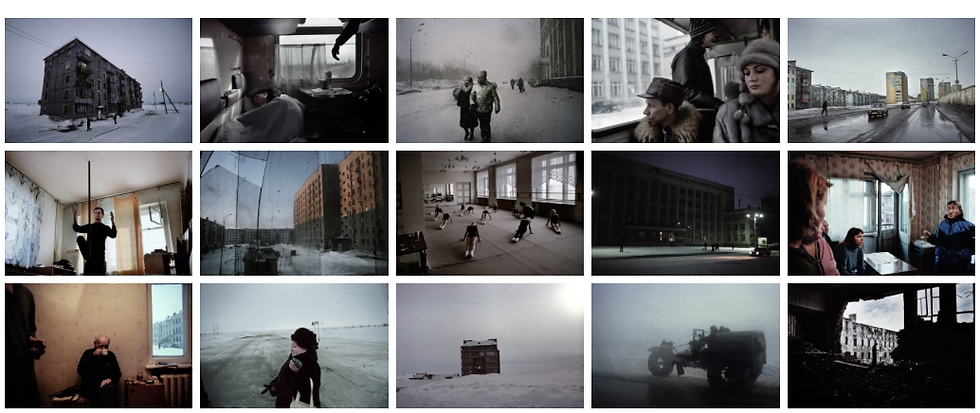
Well, I ment, at the exhibition you had in Palma recently some pictures where colorful, and on your website same one reverted to black and white. But never mind …
--------
Now a bit maybe personal question – I noticed Marina Plana’s name in your video from Russia. Did you travel and work together? How is family of Planas connected to your photography life and what do you think about the Casa Planas projects? Is it something we in Czechia should try to connect to? For research or residencies?
I will prefer not to talk about Casa Planas, as I have many personal connections to it, specially through Marina, so better I keep my mouth in silence…haha… but to have an idea, Casa Planas is mostly about it’s huge archive of tourism photography, so I’m not really interested in that part of the project. But by the way, to do residencies is not bad, although I really prefer Es Far Cultural, in Menorca. That is a really good residency site to develop a project.
Do you have some other recommendations to apply for photography residencies in Majorca or the Balearic Islands in general?
I can recommend the Es Far Cultural, in Menorca, yes.
Are Majorcan cultural official institutions aware of your work and willing to present it? Are they supporting to get it out seen? Or do you do mainly all work yourself? Open calls? Personal contacts abroad?
I have a mix of that together, even if there are institutions aware of our work, one always have to work hard himself to make it happen. Nothing is for granted.
Which public and private galleries are valuable for photography in the island? To be visited, followed or to exhibit in? Are there any particular aimed at photography? Or rather mixed – visual and fine arts?
I do not know anything about galleries in Mallorca. I’m not connected to Mallorca in these galleries terms. I do curator projects but mostly for public museums and cultural centers. I work with one gallery in Belgium mostly, and the market in northern Europe.
Ok, i mean Es Baluard, Caixa Forum (they made great exhibitions of Robert Capa en Color or Camera and the City), Casal Solleric (I saw the retrospective of Tony Catany in 2017 I think), Miro Mallorca (workshops and some experimental residencies using photography too), AbaArtLab … these I know, but I haven’t found really others and particularly aimed for photography. Just to think of that topic – maybe to plan to open one?
hahaha… good idea…let’s have it in mind…but Mallorca is complicated, people here tend to buy art only if the artist is famous, like you know it should be someone as the son of Hannover prince, who is a sculptor…. This is the kind of artists that tourists, rich tourist collectors are looking for.
Yes, that’s maybe right .. who knows, soon Michael Douglas or rather Catherine will come out with some art pieces inspired by their life in S’Estaca.
In Mallorca, you document ordinary life of locals, right? Can you tell me more about what exactly, if it’s somehow spontaneous act while meeting people, or do you have some aim in it?
Well, I never thought about documenting the ordinary life of anybody, there is of course a scent of it in what I’m doing, but to be more precise, how I see it is that I’m documenting the feelings, either of what I’m seeing or what is going on…but it’s more about a feeling than a documentation of the daily life. The only thing it have in common with the daily life is that I always use to bring the Leica with me, so it became daily life because of it maybe…
Here it is my fault – I used a bit clumsy expression. I didn’t mean you would document ordinary life, but that your work seems to me as document, although „subjective“, more about feelings and perceptions, sometimes more abstract, blur, but what I meant was you move within local lives (not ordinary – was wrong English expression). You are moving around and photographing local people of the island, your work seems in kind of opposition to tourist view … tourist don’t notice usually the heavy staff.
Yes, of course what I do is not a tourist view of things that occur in front of my lens, when I press the shutter.
What exactly the Badlands are about?
Badlands is about my home, and how it have changed and how it changes and how it looks that nothing never really changes. Badlands is about my love and hate for this island. Badlands is my fear to keep living in my village, surrounded by people who were part of the fascists during the civil war and the dictatorship. Badlands is about the memory, about the time, and about nothing…about nobody and about me. Badlands i nothing else than a void.

And what the Mallorca Bronx means?
Mallorca Bronx - I can’t remember in what context I mention Mallorca Bronx, but the first time I saw that, it was a painted graffiti in an area of s’Arenal, the biggest touristic area of the south of the island, and it was a signal that you were entering the neighborhood part were all the Africans, Gypsies and poor live. Also mixed with drug dealers and narco trafficants.
How do you see the tourist photography filling the Instagram with those posing „sex bombs“ on the beach, etc. .. all with hashtag #mallorca .. creating certain image of the island which is absolutely not complete in its testimony? I mean I always think of the fact, that life in the island is not easy at all, I have been tasting it throughout a few years in various times of the year and observing, also during Covid-19 pandemy. And then, when summer comes, many tourists come, its hot and packed with people.. but maybe the benefit of local people having job is still worth all that .. maybe it’s not … tell me about your point of view of this whole topic and how this influence your personal way of life during the periods of the year, this time more in a sense of being creative and make photographs, accomplish your work …..
That’s the main problem of my life… haha… well, somehow this question is the base of my philosophic approach, the base of thinking of how is life for human beings in this world. I do not like tourism and I don’t not agree with tourism and I think it makes people losing their identity, even for the tourism itself, also either tourists or people working in tourism, nobody is really happy, their integrity is also lost in between. But please, do not mix tourism with travelers, adventures (not tourist ones), etc. ….. basically any travel that became an investigation, or to anybody with curiosity for what one have in front of their faces, is what should move to travel and discover how are societies around us. I can’t understand what the mass tourism is about, as well as how people who work in tourism (who often are in a bad mood) can deal with that. They are mistreated, people have fun of them, and things are expensive for them, either for the tourists just because they are tourists and for the residents, because as the tourists pay more for everything, the resident pay more for the same things but without their salaries become better. It relates to the tourism worldwide, but specially in Mallorca it’s very easy to see all these cases clearly, because it’s a small place basically. I don’t like to talk about tourism in my photographs, you won’t see any tourist also in my photos, I do not like to photograph people dead inside, at least they are dead inside when practicing tourism, then they became real people again once they got back home to live their daily life. But it have some influence on my work, mostly because it’s my constant try to understand how we can survive in a world full of contradictions and struggles for everything else…poverty, education, violence, … these are hard times to keep going, but we must do it, if we want things to be changed…
My experience is that people out of Mallorca see really rarely how much of cultural heritage is here. That it is not just about beaches … or what do you think? Do people know more from the island’s culture than just Miro? Or even do they know him being connected to the Island?
I would say instead of “people out of Mallorca” - tourists. Because is tourism itself that is destroying the cultural heritage, and even also in the moment that a country is using their cultural heritage for tourists, they are changing the interest in that in some sort of souvenir shaped in a magnet, and that’s it. Instagram and internet in general haven’t been very good for the cultural heritage here, it all became senseless, it all became a bubble without sense.
No, actually I wouldn’t speak about tourists here. I’m wondering, if people outside of Mallorca, maybe those who love art, culture, etc., but do not travel at all, or not travel to “touristic destinations” at least, if they know about all the cultural richness of the Balearic Islands? Who’s fault is if they don’t know anything. Or, who’s fault is if they think the Balearic Islands are good just for tourism, to lay down on the beach or party at Ibiza, etc. Who made this image worldwide? I think I mentioned to you, I have been coming to the island since 2017, have been exploring, making research and contacts, live there very local, using local transport, no posh behaving, studying there, working on topics, visiting and trying to create meaningful exchanges, and my philosophy is “to be useful to the islands, not just consume it’s beauty”, but if I sum up it all looking back, in general I met mostly with attitude either to get most possible money or other benefit out of me, or I encounter a polite refuse of my offers for cooperation, if nothing really attractive is seen to come out of me. What is that?
…
…
And … what about our connections of the past through the Archduke Louis Salvador? He was already in those times fed up of locals, who kept inviting him to dinners just to show off themselves that they dine with aristocracy. But let’s look, what he was doing. He bought, reconstructed, maintained and gave back many properties to locals, he was cultivating, protecting, sharing, really enriching, and still might be considered as the cause of so negative tourism … or at least he stand at the beginning of it. We have such a wide topic to dive in, research and discuss here … I really see many sides.
Basically what happen to you when locals are rough, is nothing personal, and is not the same that in The times of the Archduke, in those times there was no tourism, but travelers, rich ones of course haha. But still, they were travelers in those time, a sort of a tourism, but it was not an industry itself. Tourism kill cities worldwide, not only in this island. And the reason for the locals is hard to connect with foreigners, is mostly because as there are all these millions of tourists, and most of them do not relate to any local for whatever reason, finally the foreigners became only numbers, dollars with legs (as we say in Spanish). Of course I’m concerned about this and I’m not the same that all those locals who think that way. Will explain you more later, but basically the whole idea is that MASS tourism is the whole problem. If tourism was only a small part of the cake, thing will be more different.
… and .. also … you are in this topic around tourism deep, but you mentioned that Casa Planas doesn’t interest you at all for the reason it’s mainly about tourist photography. I might understand what you mean, but still .. wouldn’t that be a source there of some better understanding? Not that you have to use their sources, but in general. We have here a big closed box of tourist issues and both sides perceptions to really look in … Actually it is something heavy on me too in this topic. Because the constant attitude of many locals towards me when staying in the island have slowly taken away from me big part of my enthusiasm to research and work on things with approach to connect …. Maybe it is part of the way .. to find the right path to walk on … maybe to be just independent of all of it .. as usually we end up in our lives J. No illusions.
Just comment on this, what comes on your mind, if you want .. we get further later step by step …. Maybe when meeting.
……..
What is your current thing you work on?
I’m working in Sardinia nowadays in a couple of stories, can’t talk about them yet, but …. just a couple of details, Sardinian people are the oldest society of Europe, they have resisted invasions of all types, from the Phoenicians, Romans, Italians, Aragonese, and what they see now as an invasion, at least in some parts of the island, is the tourism.
Aragonese were Catalans? Is Sardinia connected to your history than? Are you feeling connection to that island? Or how this came as an idea to work on?
Yes, sure. Last years I have been discovering many connections not only with Sardinians, but with the inhabitants who live in the islands. They (we I guess) are very particular. Their world, their imaginary universe, ends in the sea, and usually it’s very close to wherever they live in the inner island.
The story came to me in the shape of looking for the matriarchy societies around the world. So, that’s part of the project, but will tell you more about it soon, I’m still working on it.
Do you think it’s all about our common European roots too? I personally feel as an European myself a lot. Like politically and historically, also as something what has strong base in western values coming from the ancient Greece. Of course still valuing the beautiful cultural and language differences, etc.
But how do you perceive Europe nowadays and various opinions on if its good or bad be „one Europe“?
One Europe is not bad, but I can’t be anymore “the One Europe” with only 11 or whatever is the states that compose Europe. There are as many Europeans as we can imagine. In Germany there are people who don’t feel like Germans, as well as in Belgium there are Flamish and French, in Spain Catalans, Galizians, Basques and Castillans, etc… so Europe should be the Europe of the regions, not the Europe of the states how it is now. Or it will be more close to Bosnia conflicts among other samples.
Tomeu, from our talk, in my mind rises many new questions and more profound views on topics. So let’s keep talking further, in next rounds. I am honored to know you and really looking forward to see your new work in photography, to meet, hopefully to cooperate on exchanges between Czechia and Mallorca, to develop our work via some common residencies maybe – as photographers or curators .. to develop this exchange between our two countries similar in so many things - somehow.
Is this snow on that picture? … can’t help feeling happy, touched, kind of at home .. when seeing snow .. it’s such a big part of my life and it’s becoming quite rare, almost forgotten and so nostalgic .. even in Czechia.
In Mallorca it’s very rare. What is your relationship with this picture? .... waiting for your answer ...

Photographies in the article:
TomeuColl@Archivepictures
TomeuColl@Badlands
TomeuColl@Nevermindinsovietland
@DonnaFerrato
@GuillemBestard
@TonyCatany
@MiquelSalom













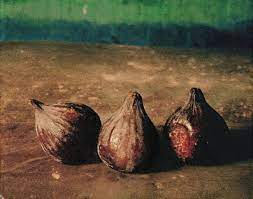
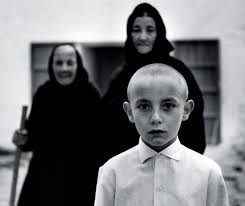
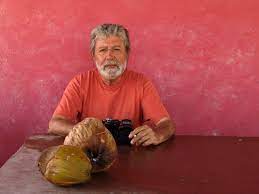
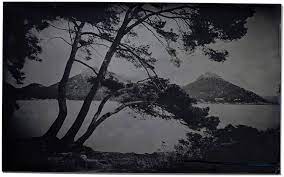
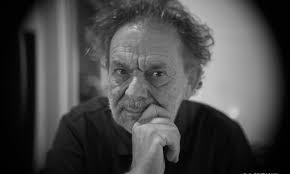
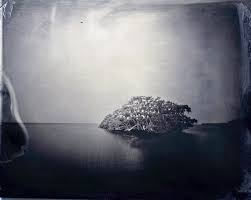



Comments